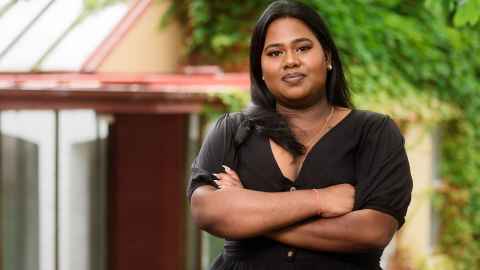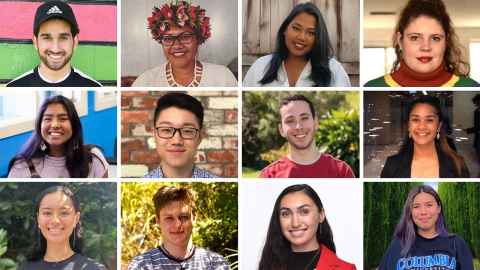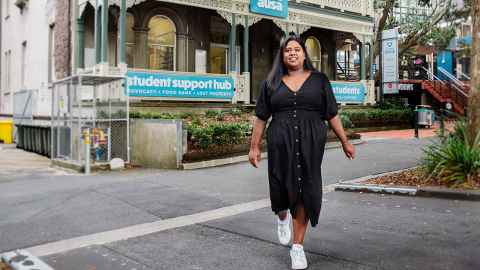AUSA president Anamika Harirajh: 'We're not struggling, we're growing'
2 March 2021
The president of the Auckland University Students' Association says students have been doing it tough but the AUSA has shaped up and grown to be the best it can be to help them.

When did you start with the Auckland University Students' Association (AUSA)?
I started as the women’s rights officer in 2019. At the end of that year, I knew I still wanted to be involved, so I decided to stand and take the position of the welfare vice-president. Of course, I didn’t know Covid was going to happen! That turned out to be an incredibly busy role.
What did you have to do?
All my time as welfare vice-president was taken up with reviewing hardship grants. Trying to balance study and work was difficult. I knew that hardship grant applications were one part of my job but I didn’t realise they’d take up all my time! But students needed help – we had triple the normal number of hardship grant applications. I read every single one – it was sad to hear the students’ stories of losing their jobs and not being able to afford rent or even bus fare to uni. Those are the students who are keeping me on the AUSA.
How many students voted in the 2020 AUSA elections in which you became president?
It was massive. In 2019 about 600 students participated. That jumped to over 4,000 in 2020 and we’re proud of that. I guess 2020 was big for elections so they were at front of mind. Students have begun to recognise the AUSA is a serious body: we had a lot of wins last year. The grade bump was a good example of how we successfully advocated for students with the University.
Given the workload, why did you put your hand up again for the role of president?
Towards the end of 2020, there were a lot of exciting things happening. One of the main achievements was our input into the new Strategic Plan and I had more to give there. If we didn’t have a general manager I wouldn’t do it, but we’re a lot better organised now that we have one. President is a full-time role and many presidents choose not to study but I’ve just done summer school and I’m doing three papers in Semester One. I’ll be ok.
What’s changed about the AUSA?
For the first time in a long time, the AUSA is in a position where we’re growing. We’ve achieved all the efficiencies we can. A couple of years ago the University looked at us and said ‘you’re not efficient; you’re not effective; you’re not representative. What are you going to do about it?’ And here we are: we have a new independent advisory board who are everything from employment lawyers to businesspeople to auditors – and they’re there to help us grow the association and look beyond our one-year terms.
Your 2020 executive has a lot of fresh faces.
They’re all new and you can’t look at that list and say it’s not representative of our diverse student community – it is. We have an incredible exec who are excited to be amongst it working for our students this year.

A couple of years ago the University looked at us and said ‘you’re not efficient; you’re not effective; you’re not representative. What are you going to do about it?’
How does it all work?
Will Watterson is our new general manager, and we have an advisory board which is working well. We also have a new Student Council made up of the faculty and school presidents from across the University. We have 17 different student representatives on that. Whenever the AUSA wants to do something, or the University needs to consult with students on a big project, we take it to the student council. Student associations across the country have asked our advice in establishing the same model.
That all sounds quite business-like. Are student unions a bit boring now?
Student unions will never go back to reflecting a single political party like they used to. We’re political not partisan. It would be detrimental if we did because we represent 44,000 students and they have diverse opinions. But we will take a stance on climate, for example, and Black Lives Matter because these are human rights causes that are relevant to our students. Significant issues on which we might advocate are taken to our student council – not just decided on by the executive.
Do you have political aspirations?
No. I am doing my BA in English and History. I love reading, writing and learning about history. I want to be a high-school teacher so after I finish next I’m going to do a postgraduate diploma in secondary teaching.
What makes you want to be President then?
I’ve seen the impact the AUSA has had and how we’re in a position now where we’re not struggling; we’re growing. I’m not just thinking to 31 November when this role ends. I’m thinking about what I’m going to do that’s will set up next year’s executive, the following year’s and five years ahead, to make sure the AUSA is in the best possible position. That’s exciting to me. It’s one of the best decisions I’ve made.
How much impact is Covid-19 having?
Students have been doing it tough. Many were casual part-time workers. Finding jobs is difficult and further lockdowns in 2021, as we’ve seen, make things harder. One of our focuses this year is our mental health campaign. Students really struggled last year with mental health and well-being. Lockdowns are isolating. One area we need to grow is the University Health and Counselling Service, and look at everything from a review of that service to a review of our assessment policies. Why are students stressed? Are there too many assignments or are deadlines too close together, or maybe there isn’t a flexible approach to extensions? Covid has just accentuated the issues.
I’ve seen the impact the AUSA has had and how we’re in a position now where we’re not struggling; we’re growing.

What are you working on now?
We’re creating our operations plan. AUSA does three main things: student voice, student support and student experience. The plan outlines our goals and shows how they align with the University’s strategic plan. The executive will present it to our student council and to the University.What’s your background?
You seem to have wisdom beyond your 22 years. What's your background?
I was born in South Africa and moved to New Zealand with my parents and older brother when I was four. We arrived with four bags of clothes and the money we had from selling our furniture. My mum was lucky enough to get a job at Auckland Hospital, so we landed on a Saturday and she started work on Monday. Seventeen years later we live in a nice house and Dad has a nice car. I have a roof over my head and food on the table. I know I’m lucky, but I’m not a product of privilege. I’m a product of hard work.
What do you hope for in 2021?
In 2020 our first-year students didn’t really get the first-year experience, spending much of it online. I hope we can cater to all the students who come to the University of Auckland not only to study but also to have fun. We want to give students that on-campus experience. Obviously there's already been a setback at the beginning of Semester One, but here's hoping we get there.
This Q and A was first published in March 2021 UniNews. Email: uninews@auckland.ac.nz